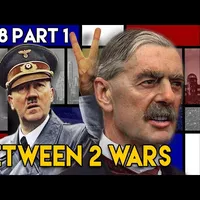Appeasement - How the West Helped Hitler Start WW2 | BETWEEN 2 WARS I 1938 Part 1 of 4 - YouTube (2)
Flushed with success, Hitler now focuses his gaze on the Sudetenland.
If you have seen our 1935 video on Czechoslovakia, you'll know all about Czechoslovakia's Sudeten
problem. Anyhow, as early as two weeks after Anschluss, Hitler is meeting with Sudeten
leader Konrad Henleinn to tell him that the Czech 'problem' will soon be solved. He also
starts publicly speaking about the harsh treatment of ethnic Germans there, claiming they deserve
to live in a greater Germany. He makes clear to the Allies that his intentions are limited
to creating one cohesive nation-state to restore order. Despite his string of broken promises,
the British public and press believe him. The Times suggests that this is actually good
for Czechoslovakia, as it will make it “a more homogeneous state by the cession of that
fringe of alien populations who are contiguous to the nation to which they are united by
race.' The allies and their citizens are convinced that offering Germany this concession
will avoid a wider conflict.
And Sudeten-Germans are Germans after all. Maybe if the Allies cede just those border
regions, Hitler will be satisfied, right? This is the advice they give to Edvard Beneš,
President of Czechoslovakia. But Beneš refuses and orders a partial mobilisation. He is not
prepared to go down without a fight. The threat of direct conflict holds off a German invasion.
But Britain and France are determined to work things out to deescalate the situation. France,
allied with Czechoslovakia, does not want to be embroiled in a war when they feel so
unready for conflict. And the Soviet Union, at this point a friend of the Czechs, cannot
deploy troops without going through Poland or Romania, two countries who benefit from
a weakened Czechoslovakia and who aren't going to let Red Army troops on their soil.
The situation is deteriorating, and the leaders of Britain, France, Germany, and Italy rush
to Munich in an emergency meeting on September 29th, 1938.
Czechoslovakia is not invited; nor is the USSR. After much discussion, the powers agree
the next day that the Allies will not intervene if Germany occupies the Sudetenland. In return,
Hitler promises that this is his last act of expansion. Czechoslovakia is pressured
by Britain and France to agree to the terms and cede its territory. Poland also wins some
land, managing to snatch Teschen away from Czechoslovakia. The annexation of the Sudetenland
gives the Nazi regime 66% of Czechoslovakia's coal and 70% of its iron and steel.
But for now, the Munich Treaty is seen as a victory for peace in Europe. Chamberlain
flies back to Britain and upon arrival waves the treaty to the crowd. He exclaims, ‘We
are resolved that the method of consultation shall be the method
adopted to deal with any other questions that may concern our two countries, and we are
determined to continue our efforts to remove possible sources of difference, and thus to
contribute to assure the peace of Europe.'
But the celebration will be short-lived, and Hitler's words will prove hollow.
The Munich Agreement becomes the final failure of appeasement. Less than 6 months later,
all of Czechoslovakia will be occupied in March 1939. A separate Slovakia, closely aligned
to the Nazis, will be carved out, and the Czech land will become the Protectorate of
Bohemia and Moravia. With Czechoslovakia out of the picture, Hitler will have crippled
the opposition against him. Guess what? The combined forces of Czechoslovakia and France
substantially outnumbered his, and them being on either side of Germany would have meant
a costly two-front war.
But the aggression has finally opened Britain's eyes. Rearmament programs now increase dramatically,
but it is too late. When Germany's goals for expansion turn to Poland, it is clear that
dreams of peace by exchanging guns for flowers and handshakes has brought nothing, except
betrayal of one's own allies, the collapse of even more democracies, and a general sense
of defeat before a single shot has been fired. The furnaces of German Naziism have fueled
the fires of the Hitlerian dreams of messianic end times. If anything, appeasement has only
fed the lizard king and grown him into a hydra.
If you want to learn more about Czechoslovakia, be sure to check out our episode about the
situation there in the mid-'30s. You can click on it right here. Our Patron of the week is
Kirill Klimuk. It is because of people like you, Kirill, that this channel can keep producing
quality content. So be sure to support us too, over at Patreon, the link is below. Don't
forget to subscribe and ring the bell.
Now as Robert California once said…
"Well, I will not be blackmailed by some ineffectual, privileged, effete, soft-penis'd, debutante.
You want to start a street fight with me bring it on but you will be surprised by how ugly
it gets, you don't even know my real name- I'm the fucking lizard king!"

